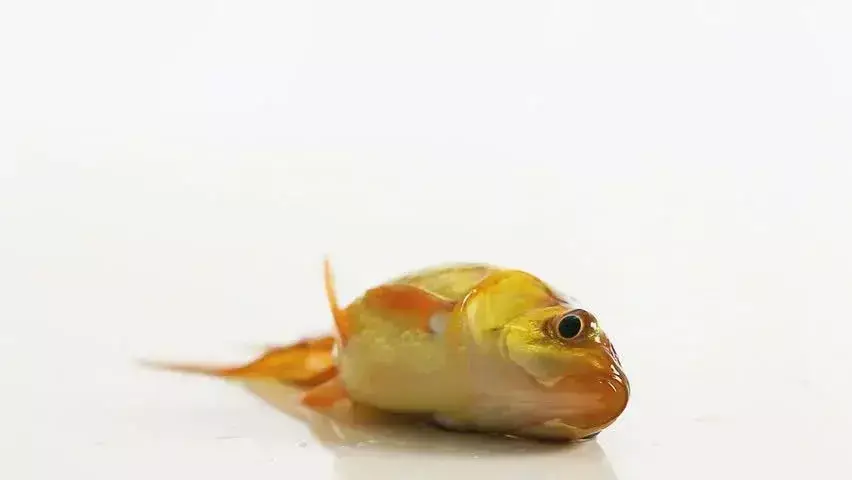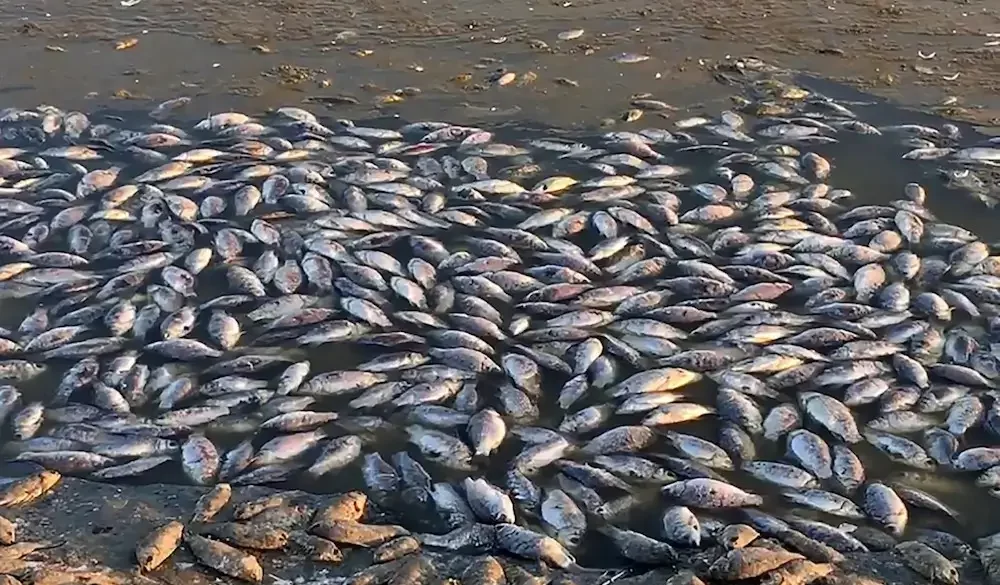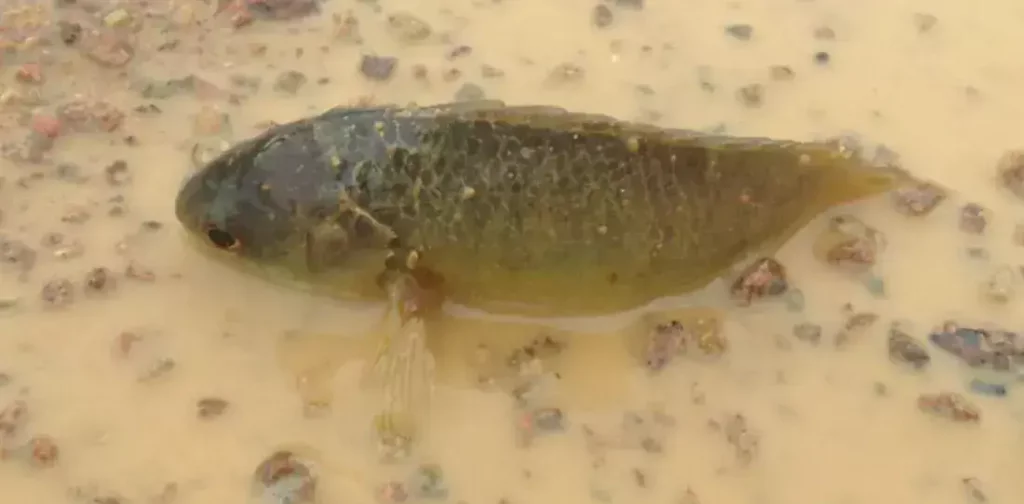When you think of how long it takes for a fish to die out of the water, the first thing that comes to mind is probably how long a fish can live on land.
But how long does it take for a fish to die out of water? The answer may surprise you. This blog post will discuss the science of fish survival and how long it takes for a fish to die out of water.
We will also cover some tips on how you can help preserve the life of a fish that has been removed from the water.
How Do Fish Breathe in the Water?

The way a fish breathes is somewhat similar to how we breathe. We have lungs that allow us to take in oxygen from the air around us and then expel carbon dioxide.
Fish can do this, but they don’t need lungs because their skin has many small holes called gills that extract oxygen from water. So when a fish is in the water, it can take in as much oxygen as it needs to survive.
How Do Fish Survive Out of Water?
When a fish is out of the water, its gills stop extracting oxygen from the water, and the fish will quickly suffocate.
This is why it is so important to keep fish out of the water for as short as possible.
In some cases, it is necessary to move a fish from one tank to another, and in these cases, you should try to minimize how long the fish is out of the water.
What Happens When a Fish Dies Out of Water?
If a fish dies out of the water, its body will decompose. This can take anywhere from a few hours to several days, depending on how warm the environment is and how long it has been removed from the water.
When a fish dies out of the water, its body will begin turning into mushy bits, which are much less appealing than fresh meat.
How Long Does It Take for A Fish to Die Out of Water?

It generally takes a fish about four to ten minutes to die out of water. This may seem like a short amount of time, but it is important to remember that every second counts when you are trying to preserve the life of a fish.
If you plan to move a fish from one tank to another, it is best to keep the time they spend out of the water as short as possible.
How Can You Help Preserve The Life Of A Fish That Has Been Removed From The Water?
Many things can be done to help preserve the life of a fish that has been removed from the water. Some of these things include:
- Keep the fish in a cool, shaded area
- Do not expose the fish to direct sunlight
- Make sure the fish has access to freshwater
- Try to keep the fish calm and avoid stressing it out
These are just some of the ways you can help preserve the life of a fish removed from the water.
If you are unsure how to do any of these things, it is best to ask someone who knows how before attempting them yourself.
How To Move A Fish From One Tank To Another
If you have ever moved a fish from one tank to another, you know that it can be a tricky process. However, there are a few things that you need to keep in mind when moving a fish:
- Make sure the new tank is set up and ready to go before you move the fish
- Gently scoop the fish out of the old tank with a net
- Do not pour water from the old tank into the new one as this can carry diseases
- Make sure to rinse off any gravel or other debris before transferring it over
Moving a fish from one tank to another is not always an easy task, but with some preparation and care, you should be able to do it without too much trouble.
If you are unsure how to do it, many online resources can help guide you through the process.
How Long Does a Fish Last Out of Water?
This is a question that has puzzled scientists for years. Numerous factors contribute to how long a fish can survive out of the water, including the fish species, the temperature of the water and air, and how long the fish was out of water.
In general, most small fish can only last for a few minutes out of the water, while larger fish can last for several hours. After that, fish out of the water will suffocate and die due to a lack of oxygen.
List of fish names with how long out of water. This list includes both marine and freshwater species that can survive for some time outside the water:
- Salmon (up to 24 hours)
- Flounder, Ebony Grouper, and Red Chinas perch (up to 18 hours)
- Tilapia (up to 12 hours)
- Trout and catfish (up to six hours)
- Goldfish, mosquitofish, and guppies (a few minutes)
Anglers and fish enthusiasts need to know how long a fish can survive out of water.
It should be done as quickly and carefully as possible to ensure the fish has a high chance of survival when releasing a fish.
Factors That Affect How Long Fish Can Survive Out of Water

There are many factors that affect how long a fish can survive out of water. The following is a list of some of the most important factors:
- Species of fish
- Temperature of water and air
- Length of time out of the water
- Amount of oxygen in the water and air
The fish species are a major factor in how long they can survive out of water. Some fish, such as salmon and trout, can live for many hours out of the water.
On the other hand, Goldfish usually only last a few minutes outside the air.
The temperature of the water and air also play an important role in how long a fish can survive out of water. In general, colder temperatures will reduce how quickly a fish dies from a lack of oxygen.
The length of time a fish is out of the water also affects how long it can survive out of water. For example, a fish that has been outside air for several hours is likely to die before one that was only out for a few minutes or seconds.
Lastly, how much-dissolve oxygen there is in the water and air greatly affects how long a fish can survive out of water. Fish need oxygen to breathe, and if the air or water is low in oxygen, they will suffocate and die.
What Happens to Fish Out of Water?
In the same way that we need air to breathe, fish need water. Without it, they suffocate (they die from lack of oxygen). They have gills instead of lungs and can only breathe underwater.
They cannot breathe out of the water like humans, or other land animals do. Therefore, their habitat is aquatic because their gills need to be wet to survive.
This is how they use the oxygen dissolved in water by extracting it through their thin skin and from tiny blood vessels called capillaries.
How Long Can You Keep Fish Out of Water?
A fish’s survival out of water depends on how long it takes for the fish to suffocate. Fish can last anywhere from a few minutes to an hour without oxygen before dying.
The amount of time a fish can survive out of the water also depends on the temperature and humidity of their environment.
In warmer, more humid environments, fish can last much longer than in cooler, dryer environments.
The maximum time a fish can survive out of water is around 20 to 30 minutes.
This assumes that the air temperature and humidity are ideal for keeping the fish alive during this period. How long does it take for a fish to die out of water in colder or warmer conditions?
Conclusion
To conclude, how long does it take for a fish to die out of the water? We have seen that several factors can impact how long a fish will survive out of the water. The first factor is how much air gets into their gills and how quickly they use up this oxygen supply.
This is determined by how big or small the fish is and how much surface area it has to breathe in air. The bigger or smaller the fish, the more oxygen they will need and how fast they will use up this supply which determines how long they can survive out of the water without dying or suffocating on land.
The second factor that can impact how long a fish will survive out of water is how much heat gets into their bodies through the skin and how quickly they use up this supply.
This can be determined by how big or small the surface area on their body has to absorb heat from outside sources like sun rays, heated air currents etcetera which impacts how long it takes for them to die out of water.

